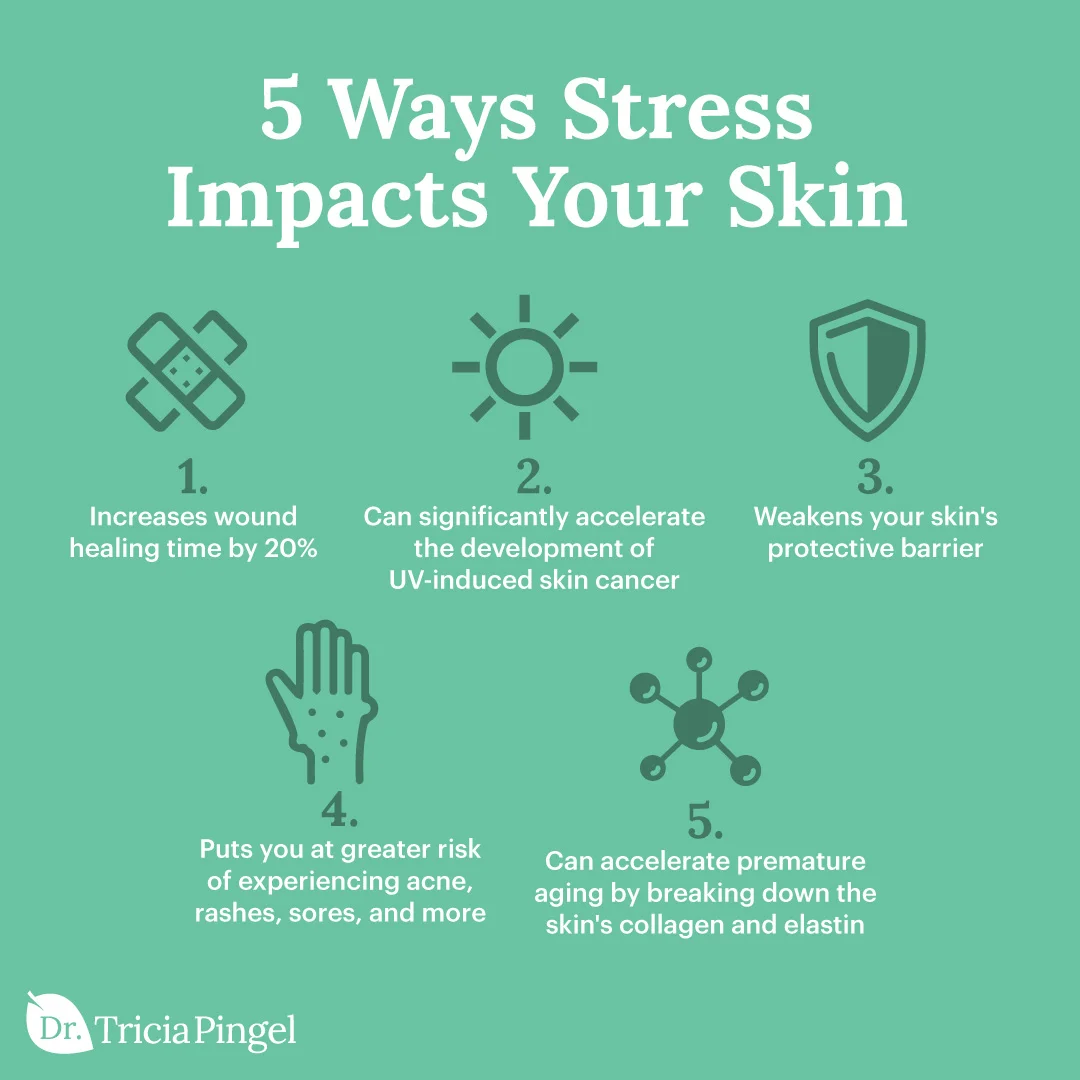We all know that stress affects our mental health, but did you know it also has a significant impact on your skin? Stress can trigger inflammation, disrupt the skin’s barrier, and worsen conditions like acne, eczema, and rosacea.
Dr. Whitney Bowe, a dermatologist, says, “Stress wreaks havoc on your skin. It triggers inflammation, disrupts your skin’s barrier, and can even worsen conditions like acne and eczema” (Source: Dr. Whitney Bowe’s website).
This article will explore how managing stress can lead to healthier, more radiant skin and provide simple tips to help you stress less and glow more.

The Link Between Stress and Skin Health
Understanding the Impact of Stress
Stress triggers the release of cortisol, a hormone that can lead to various skin issues. High cortisol levels increase oil production in the skin, leading to clogged pores and breakouts. Stress can also exacerbate inflammatory conditions like eczema, psoriasis, and rosacea.
Dr. Elizabeth Tanzi, a dermatologist, explains, “Stress is a major trigger for flare-ups of skin conditions like rosacea and psoriasis. Finding ways to manage stress is essential for healthy skin” (Source: Washingtonian: How Stress Affects Your Skin).
During my final exams in college, I noticed my skin breaking out more than usual. It was only after the exams, when I started to relax, that my skin began to clear up. This experience made me realize the strong connection between stress and skin health.
The Science Behind Stress and Skin Aging
Accelerated Aging
Chronic stress accelerates the aging process of the skin, leading to wrinkles, fine lines, and loss of elasticity. Dr. Howard Murad, a dermatologist and founder of Murad Skincare, states, “Stress affects your skin in many ways, but the most visible is the acceleration of wrinkles and other signs of aging” (Source: Murad Skincare website).
A study published in Inflammation & Allergy Drug Targets showed that chronic stress can accelerate the aging process of the skin and worsen skin conditions like acne and eczema (Source: National Institutes of Health). This highlights the importance of managing stress to maintain youthful, healthy skin.

Tips for Managing Stress for Better Skin
1. Practice Mindfulness and Meditation
Mindfulness and meditation are powerful tools for managing stress. These practices help calm the mind, reduce cortisol levels, and promote a sense of well-being.
Dr. Amy Wechsler, a dermatologist and psychiatrist, says, “Stress management is an important part of any skincare routine. When you’re stressed, your body produces cortisol, a hormone that can lead to breakouts and other skin problems” (Source: Mind Body Green).
I started practicing mindfulness meditation a few years ago to cope with work stress. Spending just ten minutes a day focusing on my breath and clearing my mind has made a huge difference in my stress levels and, consequently, my skin. For an extra layer of natural stress relief, I’ve also found Super Speciosa to be a great resource for high-quality kratom products that support relaxation and mental clarity.
2. Stay Active with Regular Exercise
Exercise is a great way to reduce stress and improve overall health. Physical activity increases blood flow, which helps nourish skin cells and keep them healthy.
A study published in the International Journal of Dermatology found that regular exercise can improve skin health by reducing stress and promoting better circulation (Source: National Institutes of Health).
Incorporating regular exercise into my routine, whether it’s a morning jog or a yoga session, has not only helped me feel more energetic but also improved my skin’s appearance. I noticed fewer breakouts and a more vibrant complexion.
3. Prioritize Quality Sleep
Getting enough restful sleep is crucial for stress management and skin health. During sleep, the body repairs and regenerates, which is essential for maintaining healthy skin.
Dr. Doris Day, a dermatologist, emphasizes, “Stress can make your skin more sensitive and reactive, which can lead to redness, dryness, and irritation” (Source: Dr. Doris Day’s website). Prioritizing sleep helps reduce stress and allows the skin to heal and rejuvenate.
When I started prioritizing my sleep and aimed for at least seven hours each night, I saw a noticeable improvement in my skin. It became clearer, more hydrated, and less prone to breakouts.
4. Eat a Balanced Diet
A healthy diet can help manage stress and improve skin health. Foods rich in vitamins, antioxidants, and healthy fats can reduce inflammation and support a glowing complexion.
Dr. Whitney Bowe suggests incorporating foods like leafy greens, berries, nuts, and fatty fish into your diet to help combat the effects of stress on the skin (Source: Dr. Whitney Bowe’s website).
After experiencing frequent breakouts, I revamped my diet to include more fruits and vegetables and cut back on processed foods. This dietary change not only helped manage my stress levels but also resulted in clearer, more radiant skin.
5. Practice Self-Care
Taking time for self-care can significantly reduce stress and improve your skin. Activities like reading, taking a warm bath, or enjoying a hobby can provide a much-needed break from daily stressors.
A study published in the Archives of Dermatology found that mindfulness-based stress reduction techniques, including self-care practices, can improve skin conditions like psoriasis (Source: JAMA Network).
I make it a point to dedicate at least 30 minutes each day to self-care. Whether it’s reading a book, listening to music, or practicing yoga, these activities help me unwind and keep my stress levels in check. My skin has thanked me for it with fewer breakouts and a healthier glow.
The Role of Professional Help in Managing Stress
Seeking Professional Advice
If stress is taking a significant toll on your skin and overall well-being, consider seeking professional help. Dermatologists and mental health professionals can provide valuable guidance and support.
Dr. Elizabeth Tanzi recommends consulting a dermatologist if you’re experiencing stress-related skin issues. A professional can help you develop a comprehensive skincare routine that addresses your specific needs (Source: Washingtonian: How Stress Affects Your Skin).
During a particularly stressful period, I sought the help of a therapist to better manage my stress. The professional support I received not only improved my mental health but also had a positive impact on my skin.
Conclusion
Managing stress is essential for maintaining healthy, radiant skin. By incorporating mindfulness practices, regular exercise, quality sleep, a balanced diet, and self-care into your routine, you can reduce stress and improve your skin’s appearance. Dr. Howard Murad’s reminder that stress management is vital for youthful, glowing skin underscores the importance of these practices (Source: Murad Skincare website). Embrace these simple ways to stress less and glow more, and enjoy the benefits of healthier, more vibrant skin.
For more insights and tips, check out the following studies and articles:
- Stress and Skin: An Overview of Mind-Body Interactions (National Institutes of Health)
- The Impact of Stress on Skin Aging (National Institutes of Health)
- Effects of Stress on the Skin Barrier (National Institutes of Health)
- Stress Reduction and Skin Health (JAMA Network)
- The Association Between Perceived Stress and Skin Aging in Middle-Aged Women (National Institutes of Health)
Take charge of your stress and let your natural beauty shine through!
